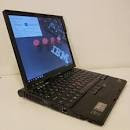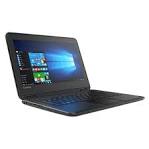Do you want a
Chromebook, or a Laptop? In education, there is a constant debate between
having a Chromebook or a Laptop as your "main" computing device.
It's budget time, and I am looking to make a few changes, but I'd love
some feedback and input from everyone so I can make informed choices. I
also know it's nice to have some facts to base a decision on, so I thought I'd
give you my take on using both Laptops and Chromebooks. Here goes....
Laptops
 Desktops were the first
small computers, but soon it was clear that users wanted "portability",
the ability to take the whole computing environment with they went somewhere
else. Thus the "portable computer" was created. Pictured
above (Compaq), you'll notice there wasn't anything REALLY portable
about it!
Desktops were the first
small computers, but soon it was clear that users wanted "portability",
the ability to take the whole computing environment with they went somewhere
else. Thus the "portable computer" was created. Pictured
above (Compaq), you'll notice there wasn't anything REALLY portable
about it! IBM offered one of the
first Laptops (Seen above). Although they called it a "Laptop", it
was really a "tabletop", but it had all the power of an IBM XT.
In fact it WAS an IBM XT in a case that could be carried.
IBM offered one of the
first Laptops (Seen above). Although they called it a "Laptop", it
was really a "tabletop", but it had all the power of an IBM XT.
In fact it WAS an IBM XT in a case that could be carried.
The whole idea of a laptop
was to make "basic" computing power truly portable, not
"luggable". Pictured above is one of the early models.
It's important to know
that there was originally a very clear distinction between a desktop and a
laptop: a laptop was for basic computing, and was always designed for use for
"essential" (read: basic) operations, thus Laptops traditionally were
less "powerful" thsn Desktops.
Takeaway: Laptops were not as powerful as Desktop and were created
for
Basic computing portability.
 Miniaturization and the
need to recover back more desk space, along with portability, has not created
Laptops that rival or even surpass Desktop computing. The IBM/Lenovo
ThinkPad is one example. Today, laptops like this generally function close
enough to Desktops to "replace" them. The basic design is still
much more like a "portable Desktop", with all the
"features" of a Desktop, including "bulky Operating Systems
(OS)", mechanical hard drives, and often "larger than life"
power requirements.
Miniaturization and the
need to recover back more desk space, along with portability, has not created
Laptops that rival or even surpass Desktop computing. The IBM/Lenovo
ThinkPad is one example. Today, laptops like this generally function close
enough to Desktops to "replace" them. The basic design is still
much more like a "portable Desktop", with all the
"features" of a Desktop, including "bulky Operating Systems
(OS)", mechanical hard drives, and often "larger than life"
power requirements.
Chromebooks
A more recent product,
Chromebooks take advantage of the availability of higher speed Internet
connections and "cloud based" computing. The Chrome OS is
"browser based" and is very small. You can think of a Chromebook more
as a terminal then a Laptop. The processing requirements are much more
limited, very little storage is required, they generally use alot less power,
and are often "faster".
Takeaway: Chromebooks are more like terminals, where the majority
of processing occurs elsewhere. They are generally browser based, and
require higher speed Internet connections to work best, but don't require
"heavy duty" resources, have small processor (CPU) memory
requirements, and do not have extensive power requirements.
Laptops, the Next Generation
 The Chrome OS is not a
Microsoft product (It's actually a Google one). Microsoft sees "the
writing on the wall" and is now offering an optimized version of Windows
10 (Win 10 Academic) that can give a Windows Laptop nearly the same performance
as a Chromebook. This device also works as a Tablet, is water resistant,
folds "flat", and has port covers. The picture above is the
Lenovo N23, with an 11.6 inch screen, often called a "2+1".
The Chrome OS is not a
Microsoft product (It's actually a Google one). Microsoft sees "the
writing on the wall" and is now offering an optimized version of Windows
10 (Win 10 Academic) that can give a Windows Laptop nearly the same performance
as a Chromebook. This device also works as a Tablet, is water resistant,
folds "flat", and has port covers. The picture above is the
Lenovo N23, with an 11.6 inch screen, often called a "2+1".
Back to where this
started... I need some help from you. As its budget time and we are
looking at what we will spend money on, I need to know from you which YOU would
like better. A Chromebook (Chrome based) or a Lenovo N23
("2+1").
You can comment
below....
thankx, mikel



Comments
Post a Comment